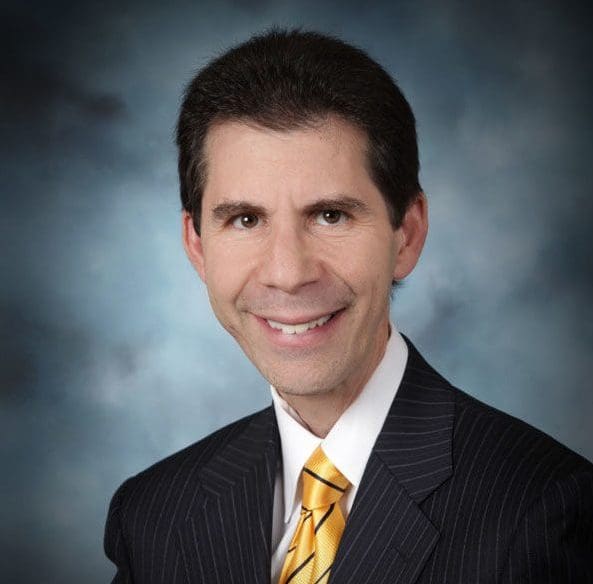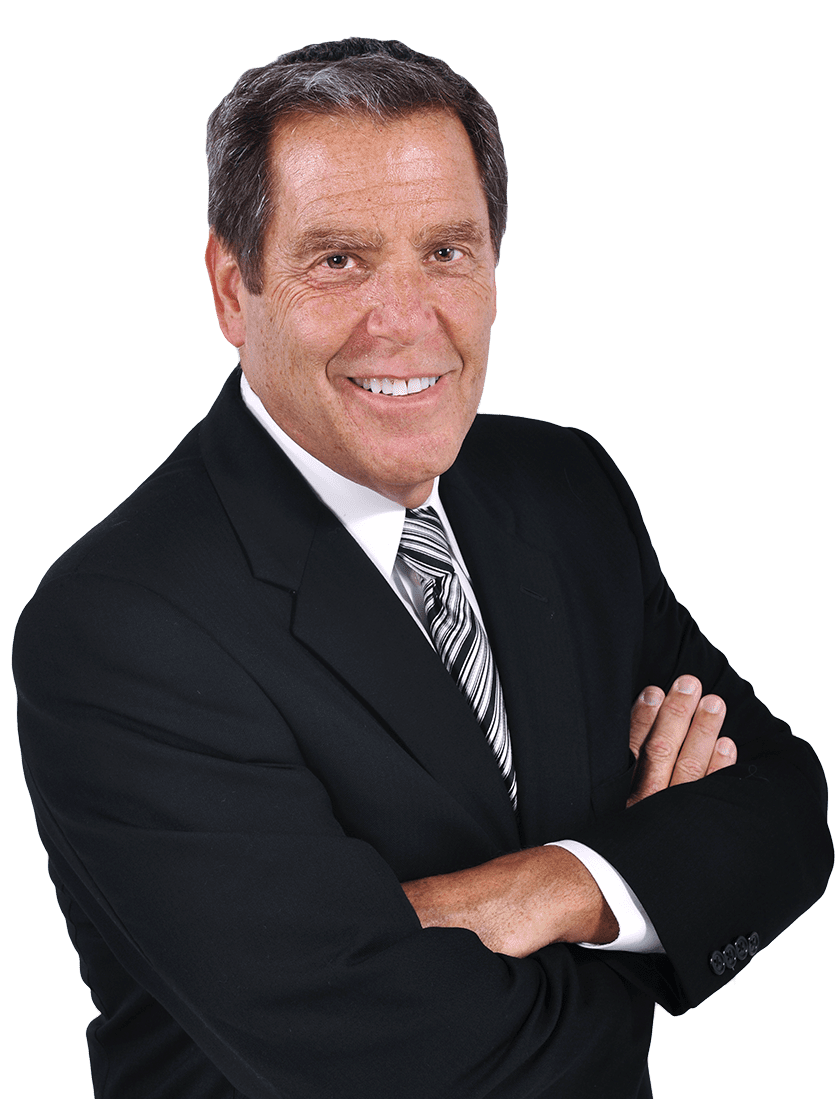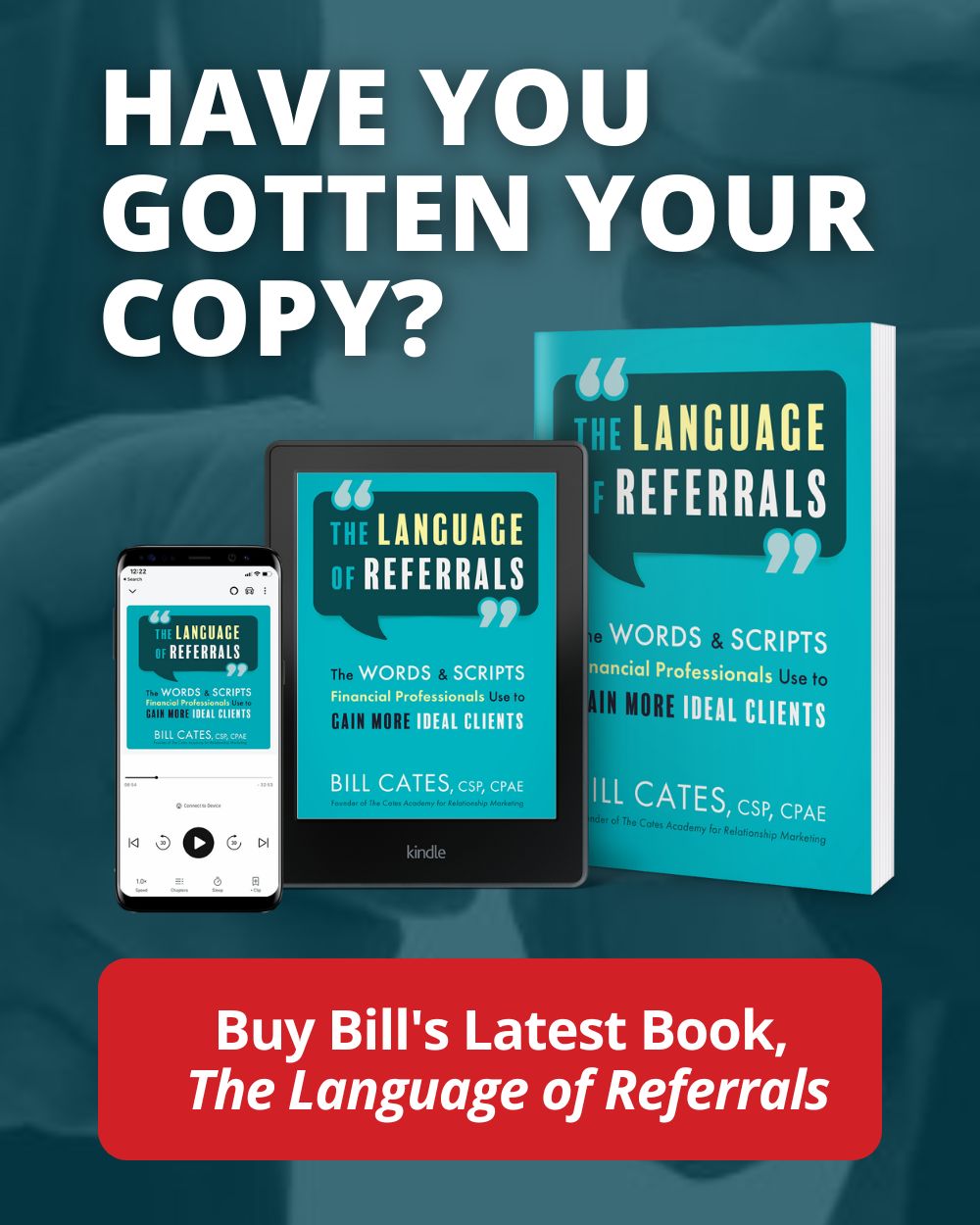Check Out Bill Cates’ NEW Top Advisor Podcast™
Interviews with Top Advisors for Top Advisors!
Top Advisor Podcast™
Ep. #11 – How to Grow Your Business Without Prospecting with Randy Carver, CRPC®, CDFA®
Stop prospecting … and let your clients prospect for you!
Creating great relationships with your clients who value the work you do and value you as a professional will open up the doors to many more in-segment clients.
In this episode, Bill Cates speaks with Randy Carver CRPC®, CDFA®, President and CEO at Carver Financial Services, Inc. Randy discusses how he and his team have brought in 25 new relationships along with $100 million in assets over the last three months without doing any prospecting.
Want More Top Advisor Podcast Episodes? CLICK HERE!
–
Randy discusses:
- How he has found incredible growth in his business over the last few months
- Why it’s important to differentiate yourself from other investment firms
- How to get your clients to do the prospecting for you
Resources:
- The Top Advisor Ep. #5: Use The 90-Day Dazzle for Client Onboarding and Win Referrals Fast with Bryan Sweet, CLU, ChFC
- 2021 Carver Palooza Crepe Party
- The Art of Impossible by Steven Kotler
Connect With Bill Cates:
-
Show Transcript
Welcome to the Top Advisor Podcast brought to you by ProudMouth’s Influence Accelerator Academy. I’m your host Bill Cates. In each episode, I interview one of the financial service industries top performers to learn their secrets to sustain success. These short interviews we’ll get right to the heart of what each top advisor is doing to acquire more right fit clients.
You’ll be reminded, renewed and inspired to take powerful action. You’ll impact more lives and increase your income at the same time. Now onto the show.
BILL: Welcome to Top Advisor’s podcast, where I interview top advisors for top advisors. Now, since I’ve been helping advisors multiply their best clients for over 26 years, I loved it when today’s guests told me, “I’ve stopped prospecting. I let my clients prospect for me.” That’s it. You create great relationships with your clients who value the work that you do and value you as an individual. And many of them become advocates and send people to you.
So my guest today, lots of initials, CRPC, CDFA, Randy Carver. Who hails from Mentor, Ohio on the shores of Lake Erie, not too far from Cleveland. Now talk about an advisory team that’s in a growth mode. Randy and his team, get this, brought in 25 new relationships. Along with a hundred million in assets over the last three months, right? Three months.
I’ve told this to a few folks on some calls and they go like, “What? Could you say that again?” And over the last month have brought in over 3 million in assets. Now that’s what I call fast growth.
So Randy Carver, welcome to the Top Advisor Podcast.
RANDY: Thanks for having me Bill.
BILL: Hey, it’s great. And you know, I’ve known you for a while and I’ve watched you grow and all the cool things you do for your clients. I think we met first at the Elite Wealth Advisor Symposium that you and Brian Sweet run every year. Great event. Enjoyed it.
Encourage other people to check out Elite Wealth Advisors Symposium. So let’s get started by having you give us a brief glimpse into your business. Provide us with a little context for the rest of the show so that people listening will get a feel for how long in business, staff, anything you think they should.
RANDY: Sure! We, as you said, are located in Mentor, Ohio. I started the company in December, 1990 and really get up and running in 91. Me and one other person. Right now we have 23 team members of which just about all but two are licensed. There’s a number of servicing people. We manage about 2.1 billion for roughly 3000 families at this point.
And like you said, we are growing like crazy. In fact, this is nuts, in the last 30 days, we’ve opened 30 relationships. So we’re looking for another sales assistant if anybody knows anybody. Yeah. I mean our business, as you said, it’s all referral based from existing clients. And every time we stop prospecting, we actually do a lot better with prospects because we spend our time here creating an amazing experience for our clients.
BILL: To what do you attribute to the GRA that rapid growth? I mean, I’m sure it’s a lot of things, but if you could peel back the curtain and give us a glimpse into what you’re doing that is creating this incredible growth.
RANDY: Well, I mean, it’s like anything else I think. Most overnight successes are 20, 30 years in the making.
I think ultimately, we’ve always done a lot of different things for the clients. It’s not really about investments and frankly, you know, no prospect leaves your office saying, “Wow, what about the downside capture that portfolio?” They’re like, “Hey, do you like that guy?” So people like you and they trust you. They think you’re sorta smart they’re going to invest. But I think what happened is with COVID, a lot of offices were shut down. People weren’t reaching out to clients and we just went all in. They are more virtual than physical and it’s it’s paying off cause we were there. And so people have told their friends.
And also, I think some of this stuff we do, whether it’s client trips or parties, that kind of thing, we don’t do any financial seminars. Like this last weekend, we did a car show. That’s not a financial seminar. Friday, we’re doing a big baseball game. We got 1800 people coming to that.
BILL: Timeout, timeout, 1800 people coming to a baseball game?
RANDY: Yeah, it’s a double A team. And honestly, if you buy 1800 tickets, they probably let you play second base if you wanted. But it’s a great experience.
BILL: But tell us about the 1800. I mean, are these clients or clients and guests? You’re just throwing like this big bash, right?
RANDY: It is big. The reason people love it, it’s actually our most popular event. We do about 14,000 a year. It’s cause they bring their kids and grandkids and so one it’s great for them.
Two, we want to see the next generation. So you know we’ve got that continuity of wealth and I think that’s the other thing is some people are so busy trying to grow they’re losing money or clients just as quick as they’re growing. And so it’s all about retention. It’s offense and defense.
BILL: Yeah. So I want to get back to events in a little bit, cause I know you do do a lot of them. You told me that and I think this is a big piece of why you’re doing so well. And it is about the client experience and not the fact that you’re prospecting. Your clients get about 70 to 80 touches per year now that’s more than any advisor I’ve ever coached or interviewed. Before we get to the how you do those and what they are, which we’d all love to know. Why so many, is there a decision, a thinking, a why behind, we want to touch people this often in some form.
RANDY: Well, I think it’s important to differentiate what’s a touch too. But it’s interesting CEG did a study of ultra high net worth people and the number was 60 to 80 times a year. So for us it touches anything that makes them think about us. Save the date post card. That’s a touch. A reminder call to come in for a meeting. That’s a touch. A confirmation for the meeting. That’s a touch. Coming in for the meeting. The thank you letter from the meeting.
So if you look at two planning meetings a year, if they get a call saying, “Hey, it’s time to come in.”, they get a call saying, “Hey, your meetings tomorrow.” If they do the meeting and then they get a thank you. Well, that’s eight touches a year.
Assuming they do two meetings and that’s without any seminars, events, web stuff and we do a monthly electronic letter and a bunch of other stuff. So I just think it’s staying in front of people. Clearly there’s a balance here of over inundating people. I think if you use one channel, you know, if you email somebody every day or every week, they’re just going to start deleting them.
I think that’s kinda crazy. So I think it’s just a balance. And obviously everybody’s different, but if I look at let’s just say we do 14 events a year and they get a save the date, plus an invitation, plus an e-invitation. Well, that’s 42 things a year. And then, like I say, with meetings caught another 16. Here, you’re already at 60 without newsletters or gifts or anything else.
So it’s not as much as it sounds like, but we’re pretty disciplined about it. Well, I think maybe that’s one of the keys you just said, right? I’m sure you have a checklist, reminders pop up, whatever it takes. You know, one of the things I’ve seen is a lot of advisors, not the most successful ones, but I’ve coached and interviewed many who they don’t really have it as organized as you do.
And I think the clients can tell if you’re kind of winging it around this and you know, it doesn’t seem to be organized and scheduled, they can tell. And they can tell when you’re organized. And I think that probably makes a quite a bit of difference.
RANDY: It goes back to the first comment, you know, if people don’t think you know what you’re doing, you’ll be the smartest person in the world.
And I know a lot of people that actually, they’ve got so many initials after their names that nobody understands what they’re talking about. And so they kill themselves because they know too much. Thye’ve got the curse of knowledge. And people just want a simple answer. And people don’t care about that.
I mean, frankly, we tell people or we don’t do financial planning, we’re not an investment firm. We just don’t do any of that. Hey, we’re here for the experience. Investments are just tools for whatever you want to do. So it’s a different model. Our trademark name is Personal Vision Planning. So it’s a little bit different.
Bill: Talk about that. So you say, “We’re not an investment firm, we’re just here to help you reach your vision.” So do you do some of that vision work with them? I mean most advisors, not all, do talk about what does retirement look like for you? What does your legacy look like?
Things like, but it sounds like you may be going into more depth around that. Tell us about.
RANDY: I think most advisors are number centric. You know, they’re talking about any of this many dollars to do this, or you’re going to have this many dollars. We don’t talk about that. I want to talk about, What’s Bill’s day look like if you retired today. Have you even thought about that? What are you going to do all day?
You know, let’s talk about that and then figure out how to do it. So again, there’s a great quote about the Grateful Dead and it’s, “They’re not the best at what they do. They’re the only ones that do what they do.” That’s us and we’re different than anybody else.
You know, I’ve had more people come to us because talking about some of the parties we’ve done or the client trips we’ve done than ever saying, “Wow, I made 10% a year.” The people don’t care about that. They care about the experiences. And so our firm was built basically to provide that experience and that’s really it.
But I think, honestly in a sea of sameness, you gotta differentiate yourself somehow. You know, from a client’s perspective, everybody says, “We give you personal attention. We give you a custom plan. We put you first. We listened to your goals and objectives.” But it sounds the same to the clients. And so you’ve got to differentiate yourself.
BILL: So it occurs to me as you’re talking, that vision, when you help someone and this is my guess, and I want you to respond to this, when you help someone really get clear on their vision and like you said, what their day looks like if they’re retired, you get to know them on a pretty personal level. Right? And when we help people get clear about anything because every brain craves clarity, they appreciate that, they like us for doing that. So this is a personal experience that you’re providing.
And that seems to me, is probably at the heart of why people stay with you. And I’m guessing at the heart of why people talk about you to others. Because of that experience. Does that makes sense?
RANDY: Yeah. I’ll give you a concrete example and this kind of blows me away. So we did a client trip to Cuba.
And we get back from the trip and I get an invitation about two months later saying you’re invited to a Carver Travel Group dinner. I’m like, what’s the Carver Travel Group? So a couple of the clients got together and formed this group and they invite all these people to dinner every two months. They call themselves the Carver Travel Group.
I mean, we didn’t do that. They do that. I go about every other time. It’s like 40 people. And guess what? They bring friends to dinner. And they don’t talk about, “Oh, we have portfolio. Like, wow, Randy made us enough money, so we could go to Cuba,” And that’s it.
Now all of this stuff is very simple, but it’s not easy to execute.
And that’s the thing, it’s creating a five star service model that’s anticipatory and different, like Ritz Carlton, you know, it’s anticipatory.
BILL: So, talk to me about this concept of letting your prospect, your clients, sorry to do the prospecting for you. Is that, is there anything that you do to make that happen?
Or does it just happen because of the experience you create?
RANDY: I think it’s both, but we need to create an atmosphere. I call it the nightclub syndrome. Yeah. If you’re in Vegas or Miami, Hey, people line up for three hours and they pay 600 bucks for $12 bottle of vodka. Why did people pay seven bucks for a cup of coffee at Starbucks? They can get a cup in the coffee room for 5 cents. What’s the experience?
And so, you know, we tell clients, first of all, we only take new clients by referral. Which is true. And we limit who we take. And if somebody wants to get in, you need to refer them.
BILL: All right. So that, that’s very intentional, obviously. You’re not asking, you’re just fading process and you’re being intentional about that, right?
RANDY: Hey, you’re in the club, right? We might let your friends in.
BILL: And do they ever ask, “Who do you let in? Who do not let in?” Which would be a good question for them to ask you I think. Cause then you teach them a little bit.
RANDY: I’ve never really been asked that.
BILL: No? Okay. All right.
RANDY: People ask, “Do you have minimums?” I get asked that.
BILL: That makes sense. And so you state that’s the way we do business. That’s the way people get access to this. It’s kind of a scarce resource. It’s clear. I mean, I can’t think of anything clearer than that.
RANDY: Well, you’ve got to execute because again, everybody says it. One of my guys puts it really well. He said, “The difference between us and everyone else. Is we actually do what we say we’re going to do.” I picked up a client yesterday and it’s amazing because most of these people, first meeting, it’s not a sales funnel. First meeting, they turn over everything to us. They came in, they gave a million dollars to a guy a year ago and guess how many times he’s called them or talked to them in a year? None. They haven’t heard from him in a year, a million dollars.
They moved everything to us. On the referral of two friends. And I’ve already touched base with them twice and I thanked him for coming in. We just send them a welcome letter. So that we will service the heck out of them. Think about it, a million dollar client, 1% fee, that’s $10,000 a year. How hard is it to spend a little bit of time?
BILL: That’s nuts. You know, we’ve interviewed Brian Sweet, your colleague & friend who you do the the symposium with. We talked about his 90 day dazzle, right? That way of staying in touch with new clients that then make them go, Wow.
So folks listening, you if the Brian Sweet episode- 90 day dazzle is up yet, probably is, go check it out.
I know you’re big on hosting events for clients. I do want to learn a little more about that and how they pay off. But first let’s pause for a quick word from our great sponsor.
[SPONSOR MESSAGE] This podcast is brought to you by ProudMouth, the influence accelerator. We help you sell less and advise more by turning you into a recognized subject matter authority. Visit us at ProudMouth.com to learn more about our influence accelerator service.
BILL: You’re listening to the Top Advisor Podcast, where I interview top advisors for top advisors. And with me today is truly a top advisor, Randy Carver, President and CEO of Carver Financial Services. And as we learned, occasional visitor with the Carver Travel Group, which is very cool, right. Anytime our clients do something without us and our name is attached to it is pretty amazing. Right. So, you told me that your firm hosts about 12 to 14 events per year.
I know that they were all live in person. COVID hits, they all went virtual. Now you’re starting to do a live again. First of all, again, why so many, right? Part of your company is almost in the meeting, planning business in some form or another, right? What’s the goal? What are you trying to accomplish?
RANDY: Well, there are different types of events. You know, some are aspirational, Navy seal, motivational type stuff. Some are more educational. We had a dietician talk about healthy eating when in quarantine during COVID. Sometimes I interview people. I interviewed Kevin O’Leary. And then sometimes it’s more focused on some current topic, you know, whether it’s politics or I think the next event we have, as I said last Saturday we did a car show. This Friday we’re doing a baseball game and the next event is called transition to retirement. We’ll talk about what you need to do to transition to retirement or think about it. And then in January we do our resource breakfast, basically talks about all the resources we have. We’ll have a speaker. This year it’s an FBI agent to talk about data security and cyber security.
So those types of things. And then we’ll have some more niche events I do. Continuing education for attorneys, whether they’re continuing education for CPAs. There are a number of companies that are large employers in our area. We’ll do some parties for the retirees because they stopped doing them.
And again, those are not big events. Might be 30, 50 people. A lot of different stuff. I mean, go to our website, steal our stuff. You can see they’re all posted.
BILL: One thing I remember you saying when I was hearing you speak at an event. You plan these out and you post them and your clients know what’s coming. Right?
RANDY: One year ahead. I just put the car show for next year in August. 2022.
BILL: Well, again, that goes back to what your colleagues says, “We actually do what we say we’re going to do” and if you plan it out, you announce it. Well, guess what? You’re held accountable. You better do it.
RANDY: I think the other problem is that they try something once and they’re like, “Oh, it didn’t work.” You gotta do it a bunch of times.
BILL: I think so. I think it takes a little of your clients getting used to you doing it. Correct? Now are you asking them to bring guests? Are you asking them to bring specific types of guests at all?
RANDY: It depends. Some events we tell them they can’t, it’s very exclusive. It’s for you. Some of them, we invite guests it just depends on the event.
So I got a question for you. I know you speak to a lot of advisors that are doing events. What are you hearing is working and what feedback as far as types of events are you getting?
BILL: Yeah, I saw a lot of people struggle with the virtual events. And then I saw a lot of people have a lot of success with the virtual events. But I’ve kind of delineated three types of events in my coaching with folks. And what I work on is one is I’ll call it a client appreciation event. We all know that. Where you’re just saying, “Thank you”, right? You’re building the business friendship. Maybe they bring a guest. Maybe you say this is an exclusive event. It’s not specifically for introductions. I think the mistake I’ve seen that people make is that they just kind of casually say to their clients, “Hey, feel free to bring a guest.”
But what they really want is a specific kind of guests and they really want them to invite someone, but they’re not purposeful in the invitation. Right.
The next type of event, which is a form of client appreciation event is a celebration event. Where there’s usually a guest of honor or a couple of honor. It could be an anniversary, could be retirement, could be a birthday. Anything where we’re helping a client celebrate something.
I love the idea that you’re going into a company and holding small celebration events because the company stopped doing it. But then you come in there and do it. I mean talk about value and getting known to these people.
And then the third type event, we call it a special invitation event, where the purpose of the event really is for introductions. So, one great example of that works obviously in person. But it has been working very well virtually for an advisor in Canada, Eric. His wine appreciation wine tasting events.
So he’ll have a wine shop that has a guy there, he’s very knowledgeable about the wines, obviously. He’ll get on the zoom and make sure they get a couple of bottles of different types of wines to the guests. The client couple, invites one or two other couples, again, all zoom and they enjoy the wine.
They get to know the advisor in a social setting, which we know is a great way to meet people for the first time. Cause then when you get into the business side of things, everything goes this easier, right? And he’s acquired a lot of business that way. So anyone struggling with the virtual event, that’s one thing I’ve seen that works very, very well.
Personally, Randy, I tend to favor smaller events only because we know that the purpose of the event is to connect with people in some form. At least that’s what I think. I mean, I know that you, a part of what you say is the experience. So maybe for you, it’s more than just the connection. It’s the whole experience you create for people.
I found smaller, better connections, but it sounds like you do all kinds of events and some are great connections. Some are just a great experience, but the whole thing fits together for you. Correct?
RANDY: I must be doing it wrong.
BILL: No, no, no. You’re, you’re not doing it wrong.
RANDY: The problem is we have so many interrelated clients. Everything gets huge and that’s actually something we’re struggling with because if we say we’re just going to invite our A clients, we did, we just invited our A clients to an intimate party, no guests. We had 750 people come, so it’s not like 20 people. That was it. If you go to YouTube, you can check it out. Carver Palooza Crepe Party. So yeah, I mean, it’s tough. We are trying to do some nichier things, but when everybody’s related to everybody, it’s like, why didn’t you invite my cousin? Why didn’t you invite my buddy?
That’s the risk of growing your practice too much. It just everything’s big. And so there’s something to be said for narrow and deep as opposed to broad.
BILL: Well, yeah. Hard to stop your momentum at this point. Actually another quick question, your colleague, friend, Brian Sweet does something he calls an ambassador program or something like that, where he does special events for people who give referrals. Treats them specially. Do you do something like that?
RANDY: We don’t, we probably should. I need to talk to him about that. We probably should do like a referral thank you party.
BILL: Yeah. There’s different ways to do it. It could be a group, the price of admission, if you will, as they introduce, they make the introductions. I’ve also seen it where advisors will have a small group, but everybody at this particular event, we’re either a client who made the introduction or the new client who is a product of the introduction. And so that’s the common denominator of everybody at the event.
RANDY: That’d be all our clients back to 6,000 people for an intimate gathering.
BILL: I love it. Well, I’m going to check out Carver Palooza. So my last question is this, a little self-reflective perhaps. Over the last 12 months, what have you learned about the business? What have you learned about yourself? How has Randy Carver grown a bit as a person over the last year?
RANDY: Yeah. I mean, I dunno it’s so much as learned but confirmed a couple things. First of all, firms that are succeeding really are not necessarily the best at investing or returns. They’re just the most adaptable, you know with COVID pivoting to more the virtual world. You gotta be there.
I mean, if you’re not there people are going to go away. Because Woody Allen said, a lot of winning is showing up. I think people are tougher than they seem. The fact is, I have faced medical challenges for 40 years. I had another heart attack this year. Plenty of stuff.
I think generally people are just tougher than they think, you know? And so, we can overcome physical, medical challenges if we want to. It’s a lot that can be done. And there’s a lot of good books and things to read on kind of doing the impossible if you will. There’s actually a book called The Art of Impossible by Steven Copper. That’s pretty good.
BILL: Thank you. Thank you. So our guest today on Top Advisor Podcast, Randy Carver, President and CEO of Carver Financial Services based in Mentor, Ohio. And this is Bill Cates reminding you that ideas do not make you more successful. Only acting on those ideas will bring you the success that you desire.
Thanks for stopping by.
RANDY: Thanks Bill.
This is Bill Cates, and you’ve been listening to the Top Advisor Podcast sponsored by ProudMouth. Be sure to click the subscribe button so you don’t miss the latest show and feel free to share this and other episodes with your colleagues. And if you want to learn more about the work I do with other top advisors, just go to ReferralCoach.com.
About Our Guest

Randy Carver was born in New York City, grew up in Baltimore, Maryland, and spent his teen years in Toronto, Canada. As a teenager, Randy started and ran several successful businesses, including a catering firm and two home renovation companies. He attended Oberlin College where he earned his degree in economics. Upon graduating in 1987, Randy opened a branch office for a regional brokerage firm in Mentor, Ohio. The office became one of the company’s most successful within three years.
Connect With Randy Carver:
![]()
Never Miss an Episode!
Click below to subscribe on your favorite podcasting platform.
P.S. Don’t keep Top Advisor Podcast a secret … share with a friend or colleague!
Click Here to Subscribe Tell a Friend

About Your Host
Bill Cates, CSP, CPAE, works with established financial advisors to speed up their growth without increasing their marketing budget. Advisors tap into Bill’s proven process to multiply their best clients through introductions from advocates and Centers of Influence (such as CPAs and attorneys), communicate their value proposition more effectively, and create a reputation in a profitable target market. Bill helps advisors move from push prospecting to magnetic marketing – to attract more Right Fit Clients™.
Bill is the author of four best-selling books, Get More Referrals Now, Don’t Keep Me a Secret, Beyond Referrals, and Radical Relevance. Bill is a highly sought-after international speaker and coach, as well as the founder of The Cates Academy for Relationship Marketing™.
Do you know someone Bill should interview (including yourself)?
Do you have a topic you’d like to see covered?
Contact Bill Cates directly: BillCates@ReferralCoach.com








